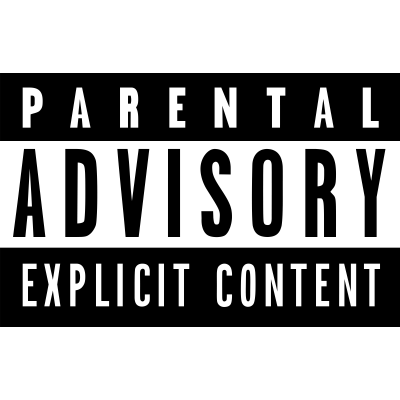
This image has format transparent PNG with resolution 400x400.
You can download this image in best resolution from this page and use it for design and web design.
Parental Advisory PNG with transparent background you can download for free, just click on download button.
Parental Advisory (abbreviated PAL) is a warning label introduced by the Recording Industry Association of America (RIAA) in 1987 and adopted by the British Phonographic Industry (BPI) in 2011. The label is placed on audio recordings in recognition of inappropriate references, such as sexual content or profanity, with the intention of alerting parents of material potentially unsuitable for children. The label was first affixed on physical 33 1/3 rpm records, compact discs and cassette tapes, and it has been included on digital listings offered by online music stores. In PAL-region territories, some video games featuring licensed music were affixed with the label in the late 1990's and early 2000's.
Recordings with the Parental Advisory label are often released alongside a censored version that reduces or eliminates the objectionable material. Several retailers will distribute both versions of the product, occasionally with an increased price for the censored version, while some sellers offer the amended pressing as their main options and choose not to distribute the explicit counterpart. The label has been widely criticised as ineffective in limiting the inappropriate material to which young audiences are exposed.
Since its introduction, the effectiveness of the Parental Advisory label has frequently been called into question. Jon Wiederhorn from MTV News suggested that artists benefited from the label and noted that younger customers interested in explicit content could more easily find it with a label attached. On behalf of Westword, Andy Thomas said that the label was purposeless on the grounds that a young customer "would get a copy of the album sooner or later from a friend or another lethargic record store clerk" like the cashier that sold him a labeled pressing of La Sexorcisto: Devil Music, Vol. 1 (1992) by White Zombie in his childhood. He noted that its intended reaction in parents was varied; his lax mother was indifferent towards the warning, while the stricter mother of his companion did not allow her child to listen to the record.
Danny Goldberg from Gold Village Entertainment opined that the Parental Advisory label offered minimal value other than "being a way for certain retailers like Wal-Mart to brand themselves as 'family friendly'"; he felt that children were successful in getting content they desired "even before the Internet", and believed that the label had little impact on sales figures. In contrast, the RIAA maintains that "it's not a PAL Notice that kids look for, it's the music". They stated that research they had gathered revealed that "kids put limited weight on lyrics in deciding which music they like, caring more about rhythm and melody" and implied that the label is not a deciding factor for a given purchase. Tom Cole from NPR commented that the Parental Advisory label has become "a fact of music-buying life", which made it difficult for current consumers to understand the widespread controversy that came about from its introduction. Greg Beato of Reason observed that by the 1990s, "A hip-hop album that didn't warrant a Tipper sticker was artistically suspect."
The label has become well known enough to be parodied. Guns N' Roses's 1991 albums Use Your Illusion I and Use Your Illusion II included a similarly-styled sticker saying "This album contains language which some listeners may find objectionable. They can F?!* off and buy something from the New Age section."
In this page you can download free PNG images: Parental Advisory sticker PNG images free download